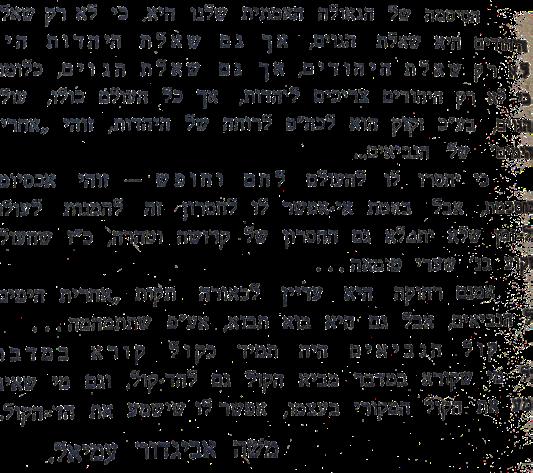
3 minute read
ARE WE THERE YET?
Rabbi Reuven Brand
The child in us never dies. This is a good thing, especially when it comes to our connection with Hashem. Rabbi Joseph B. Soloveitchik praised our childlike spiritual qualities in a magnificent eulogy for his longtime friend, Rabbi Chaim Heller zt”l, lauding Rabbi Heller’s childlike sincerity, purity and genuine emunah
Advertisement
A hallmark of childhood is the familiar question “are we there yet?” Whether shouted from the back of an Oldsmobile station wagon or murmured from the middle seat of a transatlantic flight, children constantly repeat this familiar refrain. In truth, it is a question that continues to plague us even as we grow into adulthood.
As adults, we may catch ourselves asking “are we there yet” when checking Google Maps or Waze, but we also ask this when reflecting on the deeper purpose of our lives. We often create our personal image of what “getting there” looks like, such as financial security or achieving a particular life cycle milestone. Year after year, we ask: are we “there” yet, but “there” seems always just out of reach.
Most importantly, on rare occasions, our inner child asks this question on a deep, spiritual level.
At some point in our lives, most of us have been “there” spiritually. We have felt a serene moment of Divine closeness, whether standing at the foot of the Kotel at sunrise, while walking quietly in a snow-covered path in Eastern Europe or swaying during Shemoneh Esrei of Neilah In the months and years following those powerful experiences, we try to recover those “high” moments, to once again climb the mountain of Hashem and arrive at that great spiritual destination.
This yearning of our souls is essential to living a G-dly life. It drives us to pursue aspirational paths of religious growth and to reach beyond our current state of being. But this yearning is also hazardous and comes with a cost. For how often in our lifetime do we actually “arrive”? And even when we do, how long do we stay in that holy state? As David HaMelech asked, ֹוׁשְדָק
“Who shall ascend the mountain of Hashem, and who shall stand in His holy place?” We may ascend the mountain, but don’t stay there very long.
How long can we pursue an elusive goal before becoming frustrated and disillusioned? Does Hashem really want us to spend our entire lives chasing a goal that we can rarely achieve and slips through our fingers in the blink of an eye?
The answer is yes and no. Yes, Hashem wants us to lead a life of searching, striving, and pursuing. But at the same time, this pursuit is not about arriving at a destination. The pursuit itself – the spiritual seeking – is the goal.
Rav Kook describes this in his personal writings: “I am always connected to the holy pain of seeking higher completion, a yearning that is not satisfied and need not be satisfied… but the thirst itself must grow greater and greater, and this itself will become the source of the deepest pleasure…”
Spiritual seeking is fueled by youthful impatience. But once we realize that the journey, the yearning for G-d, is itself the goal, we slow down and appreciate each step. We can worry less about whether we are “there” yet and focus more on the journey and how we are doing along the way.1 We discover that true spiritual accomplishment does not “arrive” at some later point, but rather is experienced now, in the search itself.
This approach to life is individually affirming and rewarding, and it can also help us relate to our collective Jewish reality, specifically the Jewish state.
The Torah luminaries who embraced and amplified the values of Religious Zionism in the modern era articulated a vision of a nation whose society and political institutions would shine with an authentic spiritual light. They foresaw the destiny of our people in its fullest national expression of kiddush Hashem. Unfortunately, we have not yet arrived at this destination. The reality we experience today, seventy-five years after the founding of the State of Israel, is not ideal. It’s easy to wonder: why are we not “there” yet?
However, if we understand and accept that Hashem’s expectation of us is to sanctify the journey and appreciate the opportunity to bring His light into the process of redemption, we can worry less about the ultimate destination.
May we appreciate the gift of the State, Land, and people of Israel and its remarkable blessings – every step of the way!
1. A halachic example of seeing the journey as the destination is the concept of תֹועיִסְפ רַכְׂש, reward for walking to tefillah in a synagogue. While there’s no spiritual benefit in purchasing tefillin or arba’a minim at a Judaica store farther from your home, it is preferable to pray in a shul that is farther away than others, when all other factors are equal. Rav Yitzchak Hutner zt”l uses a comment of the Maharal to explain this phenomenon, noting that tefillah is about the process of coming closer to Hashem. It is a journey. Hence, any preparatory walking is itself part of the process of tefillah and praiseworthy. Unlike other mitzvot that are result oriented, the goal of tefillah is the process of journeying close to Hashem.
Rabbi Reuven Brand is the Rosh Kollel of the YU Torah MiTzion Kollel, a community Torah institution with a vibrant Beit Midrash, array of creative learning opportunities, unique women’s initiative and diverse outreach programming. He lives in Skokie, Illinois with his wife, Nechama, and their five children.







